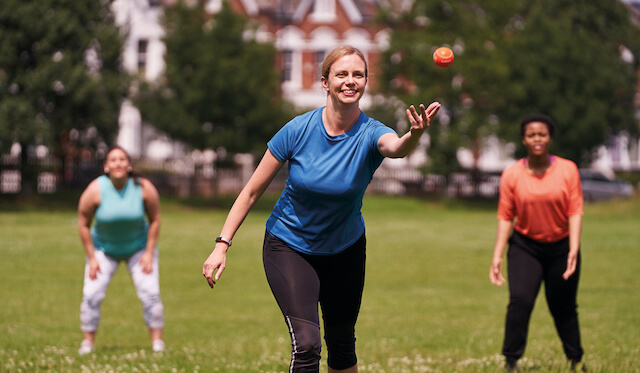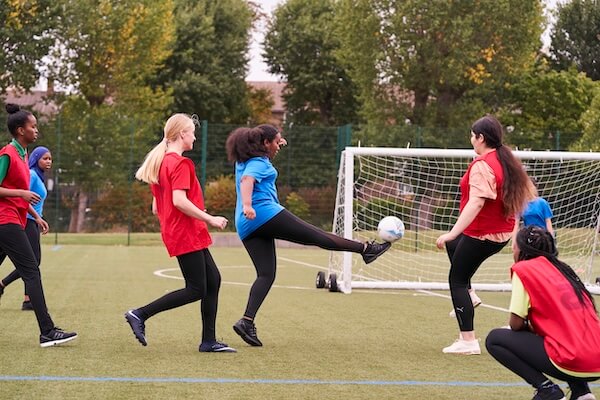
If you’re bored of doing the same old run by yourself or your gym routine, maybe it’s time to try something new. And we don’t mean something crazy or a fad, but something that will stay with you for the rest of your life. Social sports are the perfect activity if you want to explore a new hobby while also connecting with others in a safe environment. It is an activity that forces you to be part of a team and not just an individual player. Social sports are activities that use sport as a means of bringing people together in a friendly and competitive environment. There are different types of social sports, such as bowling, volleyball, golf or Ultimate Frisbee, among others. They offer many benefits for both your body and mind
Fitness and Health Benefits
Social sports, such as basketball, soccer, and tennis, provide
numerous physical health benefits.
First and foremost, participating in social sports can improve
cardiovascular health. The running and jogging that often occur
during social sports can increase heart and lung function, leading
to a lower risk of heart disease and stroke.
In addition to improving cardiovascular health, social sports can
also lead to stronger muscles and bones. The physical activity
required during these sports can help to build and maintain muscle
mass, while also strengthening bones. This can be especially
beneficial for older adults, as it can help to prevent
osteoporosis and falls.
Furthermore, social sports can also aid in weight loss and
management. The calories burned during these activities can help
to reduce body fat, leading to a healthier weight.
Participating in social sports can also improve coordination,
balance, and flexibility. These skills can help to reduce the risk
of injuries and falls, making social sports a safe form of
physical activity.
Meet New People
Social sports are a great way to meet new people. Whether you are
a single parent, just out of a long-term relationship or trying to
meet new people after a move, social sports are a great way to
start. You will be playing in a group of people that has one thing
in common: the love for sports. This opens the door to have
conversations with people you might otherwise never have a chance
to meet. Whether it's joining a team or simply playing a pickup
game, these activities allow individuals to interact with others
and build relationships. This can be especially beneficial for
those who may feel isolated or lack social connections.
In addition to providing a way to make new friends, social sports
can also promote teamwork and cooperation. Working together as a
team to achieve a common goal can help to build communication and
problem-solving skills, as well as foster a sense of community.
This sense of community can be especially valuable for those who
may not have a strong support system in their personal lives.
Social sports can also serve as a way to bring people together
and promote inclusivity. Regardless of age, gender, or ability
level, these activities provide a way for individuals to come
together and participate in a common activity. This can help to
break down social barriers and promote a sense of unity.
Mental Health Benefits
One of the primary mental health benefits of social sports is
stress relief. Participating in physical activity, such as running
and jogging, can help to release endorphins that can improve mood
and reduce feelings of anxiety and depression. Additionally, the
focus and concentration required during these activities can serve
as a mental distraction, providing a temporary reprieve from the
stressors of daily life.
In addition to stress relief, social sports can also provide a
sense of accomplishment and boost self-esteem. As individuals
improve their skills and achieve their goals, they may feel a
sense of pride and accomplishment that can translate into other
areas of their lives. This can be especially beneficial for those
who may struggle with low self-esteem or lack a sense of purpose.
Moreover, social sports can serve as a way to improve mental
well-being by providing a sense of support and belonging. The
social aspect of these activities can help individuals to feel
connected to others, which can be especially beneficial for those
who may lack strong social connections in their personal lives.
Furthermore, participating in social sports can also improve
cognitive function and brain health. The physical activity
required during these activities can increase blood flow to the
brain, which can help to improve brain function and potentially
reduce the risk of cognitive decline.
Finally, social sports can also serve as a way to improve sleep
quality. The physical activity and endorphins released during
these activities can help to tire the body and promote relaxation,
leading to a better night's sleep.
Networking Opportunity
Besides health and confidence, social sports are a great opportunity to start networking. It is a great way to meet people that can potentially help you find a job or have other useful connections in life. You will be playing in a group of people that has one thing in common: the love for sports. This opens the door to have conversations with people you might otherwise never have a chance to meet. As you get better at the sport and you start winning, you will gain a great sense of confidence. It will also be a great way to meet people that can help you find a job or have other useful connections in life.
Final Words
Social sports are activities that use sport as a means of bringing people together in a friendly and competitive environment. Social sports also offer numerous benefits that can improve an individual's overall well-being. Whether it's providing an opportunity for socialization, promoting teamwork and cooperation, or serving as a way to relieve stress and improve mental health, these activities can have a positive impact on one's social connections and well-being. Just make sure to pick a group that suits you and your preferred competition level.






